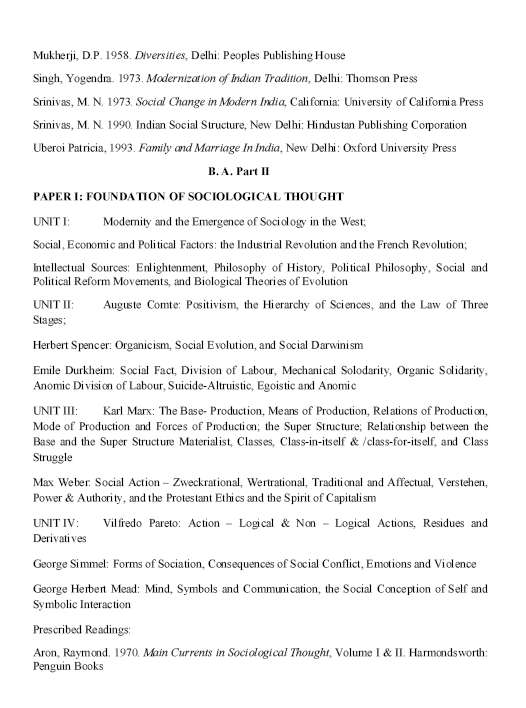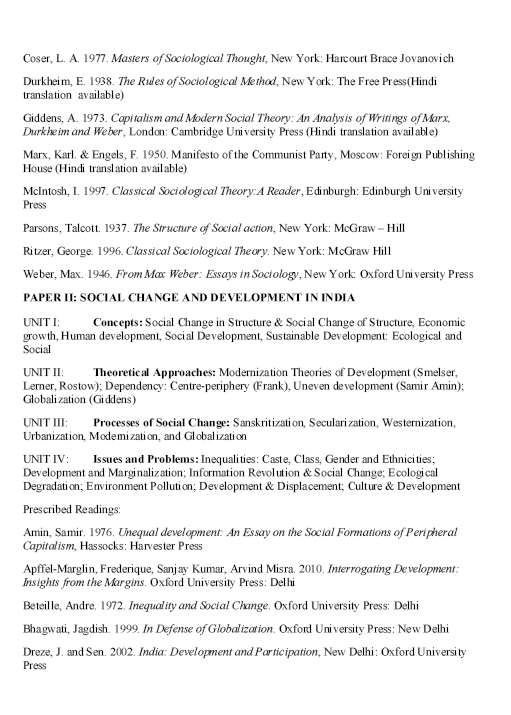| Re: Lucknow University BA Sociology Syllabus
University Of Lucknow was established in the year 1921. It is located at Lucknow, India . It is affiliated to UGC .
It offers three year duration BA Sociology course .
As you are looking for the Lucknow University BA Sociology Syllabus , here I am providing same for you .
B. A. Part I
PAPER I: INTRODUCTION TO SOCIOLOGY
UNIT I: Sociology and Common Sense; Sociology as a Science; Sociology and other Social sciences (Anthropology, Psychology, Economics, Political Science, History); Sociology as a Perspective; Sociological Imagination; Sociology as Humanistic Discipline; Practical Significance of Sociology.
UNIT II: Basic Concepts I: Social Action and Social Relationship; Status and Roles; Social Group, Community and Association; Society and Social Structure; Social Organization and Social System; Social Institution: Family, Education, State and Religion.
UNIT III: Basic Concepts II: Norms (Folkways and Mores), Sanctions and values; Cooperation, Competition and Conflict; Acculturation, Assimilation and Integration; Social Control and Socialization; Culture, Civilization and Personality; Pluralism, Multiculturalism and Cultural Relativism
UNIT IV: Social Stratification: Meaning, Forms and Bases; Social Mobility: Meaning, Nature and Types; Social Change: Meaning, Types and Factors; Social Movements: Meaning and Types.
Prescribed Readings:
Berger, P. 1963. An Invitation to Sociology: A Humanistic Perspective, Bantam: Doubleday Dell Publication
Bottomore, T. B. 1973. Sociology: A Guide to Problems and Literature, Bombay: George Allen & Unwin (Hindi translation available)
Davis, Kingsley. 1973. Human Society, New York; Macmillan (Hindi translation available)
Giddens, Anthony et.al. 2009. Introduction to Sociology, London: Polity Press (Hindi translation available)
Haralambos, M. & M. Holborn. 2008. Sociology: Themes and Perspective, New York: Collins Educational
Inkles, Alex. 1987. What is Sociology, New Delhi:Prentice-Hall (India)
Johnson, H. M. 1961. Introduction to Sociology, New Delhi: Allied Publishers (Hindi translation available)
Mills, C.W. 1959. The Sociological Imagination, London: Oxford University Press
Schaefer, R. T. and Robert P. Lamm. 1999. Sociology, New Delhi: Tata McGraw Hill
PAPER II: SOCIETY IN INDIA
UNIT I: The Textual and the Field Views of Indian Society; Interface between the past and the Present; Basic Features of Traditional Indian Social System; Unity and Diversity in Indian Society
UNIT II: Demographic Profile of India: Characteristics of Indian Population in terms of Growth, Age, Sex, Religion, Language, Occupation and Scheduled Castes and Scheduled Tribes;
Tribal Communities in India: Geographical Distribution, Assimilation, Integration and Assertion;
Religions in India: Tribal, Hinduism, Buddhism, Islam and Christianity;
Regional Diversities: Issues of Autonomy, Identity and Integration;
UNIT III: Marriage in India: Tribal, Hindu, Muslim, Christian and Trends of Change;
Family in India: Household, Joint Family, Nuclear family and Trends of Change;
Kinship in India: Patriarchy, Matriarchy, Lineage & Descent and Types of Kinship Systems in India;
Caste System: Perspectives (GS Ghurye, M N Srinivas, Louis Dumont),
Features, Aspects of Change.
UNIT IV: Indian Villages: Social Structure and Features; Indian Cities: Social Structure, Features and Types; Rural Urban Interaction;
Social Classes in India: Agrarian-Rural and Industrial-urban;
Exclusion versus Inclusion: Backward classes, Dalits, Minorities, and Women;
Prescribed Reading:
Chauhan, B. R. 2002, India: A Socio-Economic Profile: New Delhi: Sterling
Dube, S.C. 1956. India’s Changing Village, London: Routledge and Kegan Paul
Dube, S. C. 1990. Indian Village, London: Houltledge
Karve, Irawati. 1961. Hindu Society: An Interpretation, Poona: Deccan College
Dube, S. C. 1995. Society in India, New Delhi: National Book Trust
Lannoy R. 1971. The Speaking Tree: A Study of Indian Society and Culture, Delhi: OUP
Mandelbaum, D.G. 1970. Society in India, Bombay: Popular Prakashan
Mukherji, D.P. 1958. Diversities, Delhi: Peoples Publishing House
Singh, Yogendra. 1973. Modernization of Indian Tradition, Delhi: Thomson Press
Srinivas, M. N. 1973. Social Change in Modern India, California: University of California Press
Srinivas, M. N. 1990. Indian Social Structure, New Delhi: Hindustan Publishing Corporation
Uberoi Patricia, 1993. Family and Marriage In India, New Delhi: Oxford University Press
B. A. Part II
PAPER I: FOUNDATION OF SOCIOLOGICAL THOUGHT
UNIT I: Modernity and the Emergence of Sociology in the West;
Social, Economic and Political Factors: the Industrial Revolution and the French Revolution;
Intellectual Sources: Enlightenment, Philosophy of History, Political Philosophy, Social and Political Reform Movements, and Biological Theories of Evolution
UNIT II: Auguste Comte: Positivism, the Hierarchy of Sciences, and the Law of Three Stages;
Herbert Spencer: Organicism, Social Evolution, and Social Darwinism
Emile Durkheim: Social Fact, Division of Labour, Mechanical Solodarity, Organic Solidarity, Anomic Division of Labour, Suicide-Altruistic, Egoistic and Anomic
UNIT III: Karl Marx: The Base- Production, Means of Production, Relations of Production, Mode of Production and Forces of Production; the Super Structure; Relationship between the Base and the Super Structure Materialist, Classes, Class-in-itself & /class-for-itself, and Class Struggle
Max Weber: Social Action – Zweckrational, Wertrational, Traditional and Affectual, Verstehen, Power & Authority, and the Protestant Ethics and the Spirit of Capitalism
UNIT IV: Vilfredo Pareto: Action – Logical & Non – Logical Actions, Residues and Derivatives
George Simmel: Forms of Sociation, Consequences of Social Conflict, Emotions and Violence
George Herbert Mead: Mind, Symbols and Communication, the Social Conception of Self and Symbolic Interaction
Prescribed Readings:
Aron, Raymond. 1970. Main Currents in Sociological Thought, Volume I & II. Harmondsworth: Penguin Books
Coser, L. A. 1977. Masters of Sociological Thought, New York: Harcourt Brace Jovanovich
Durkheim, E. 1938. The Rules of Sociological Method, New York: The Free Press(Hindi translation available)
Giddens, A. 1973. Capitalism and Modern Social Theory: An Analysis of Writings of Marx, Durkheim and Weber, London: Cambridge University Press (Hindi translation available)
Marx, Karl. & Engels, F. 1950. Manifesto of the Communist Party, Moscow: Foreign Publishing House (Hindi translation available)
McIntosh, I. 1997. Classical Sociological Theory: A Associate Professor, Edinburgh: Edinburgh University Press
Parsons, Talcott. 1937. The Structure of Social action, New York: McGraw – Hill
Ritzer, George. 1996. Classical Sociological Theory. New York: McGraw Hill
Weber, Max. 1946. From Max Weber: Essays in Sociology, New York: Oxford University Press
PAPER II: SOCIAL CHANGE AND DEVELOPMENT IN INDIA
UNIT I: Concepts: Social Change in Structure & Social Change of Structure, Economic growth, Human development, Social Development, Sustainable Development: Ecological and Social
UNIT II: Theoretical Approaches: Modernization Theories of Development (Smelser, Lerner, Rostow); Dependency: Centre-periphery (Frank), Uneven development (Samir Amin); Globalization (Giddens)
UNIT III: Processes of Social Change: Sanskritization, Secularization, Westernization, Urbanization, Modernization, and Globalization
UNIT IV: Issues and Problems: Inequalities: Caste, Class, Gender and Ethnicities; Development and Marginalization; Information Revolution & Social Change; Ecological Degradation; Environment Pollution; Development & Displacement; Culture & Development
Prescribed Readings:
Amin, Samir. 1976. Unequal development: An Essay on the Social Formations of Peripheral Capitalism, Hassocks: Harvester Press
Apffel-Marglin, Frederique, Sanjay Kumar, Arvind Misra. 2010. Interrogating Development: Insights from the Margins. Oxford University Press: Delhi
Beteille, Andre. 1972. Inequality and Social Change. Oxford University Press: Delhi
Bhagwati, Jagdish. 1999. In Defense of Globalization. Oxford University Press: New Delhi
Dreze, J. and Sen. 2002. India: Development and Participation, New Delhi: Oxford University Press
Dube, S.C. 1988. Modernization and Development: the Search for Alternative Paradigm, New Delhi: Vistar
Dube, S.C. 1992. Understanding Change. Vikas Publishing House: New Delhi.
Dyson, Tim, Robert Cassen & Leela Visaria. 2005. Twenty-First Century India: Population, Economy, Human Development, and the environment. Oxford University Press: Oxford.
Frank, A.G. 1966. The Development of Underdevelopment, Monthly Review, September XVIII.
Parr, Sakiko Fukuda & A.K. Shiva Kumar (eds.). 2009. Handbook of Human Development: Concepts, Measures, and Policies. Oxford University Press: Oxford.
Singh, Yogendra. 1973. Modernization of Indian Tradition, Delhi: Thomson Press
So, Alvin Y. 1990. Social Change and Development: Modernization, Dependency and World-System Theories, New York: Sage Publications
Srinivas, M.N. 1973. Social Change in Modern India, California: University of California Press
Srinivas, M.N. 1990. Indian Social Structure, New Delhi: Hindustan Publishing Corporation
United Nations Development Programme. 1995. Sustainable Human Development: From Concepts to Operation, New York: UNO
For detailed syllabus , here is the attachment
Contact Details :
Lucknow University
University Rd, Hasanganj, Lucknow,
Uttar Pradesh 226007
0522 274 0086
|



